|
Where does the time go? It's hard to believe that once again I am closing
out a year by choosing the always subjective list comprising the Best Albums
of 2004. As is the habit here on Talkin' Broadway, the list has been divided
into two categories: Best Theatrical and Best Vocal Albums. As
always, the chief criteria for inclusion on either of these lists is that the
album was a new release versus a reissue of previously recorded material
(this year saw a marked decline, unfortunately, in the percentage of new
recordings versus reissues). Secondly, the album had to have been released
in 2004. The chief deciding factor, however, is how often the album graced
my CD player or IPod, or better yet, how many times I forced others to
listen to it.
Going over the candidates this year, I quickly realized that
2004 was one of the most miserable of years
for original cast recordings in quite some time. While there were a lot of
good, solid albums, there were few truly great ones. And even worse, a
dismally small number of theatrical albums came from Broadway, and there
were far more recordings featuring revivals, revues or rarities from the
past than there were true 'original' cast albums. And to be blunt, three of
the theatrical albums that graced last years' 'best of' list (and one that
didn't even make it) are played much more frequently on my IPod than any
from this years' list (they are, for the record,Avenue Q, Wicked,
Nine and The Boy From Oz, the last of which makes for a guiltily
great work-out album.)
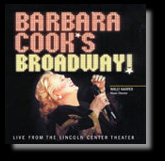 The best 'Broadway' album of the year, Barbara Cook's Broadway
celebrates two of America's greatest musical treasures: the genre of musical
theater and the genius of Barbara Cook. A live recording from her most
recent show, the CD showcases a performer who keeps getting better with
maturity. The loss of its music director, Wally Harper, last year gives
the album a bittersweet grace note. The best 'Broadway' album of the year, Barbara Cook's Broadway
celebrates two of America's greatest musical treasures: the genre of musical
theater and the genius of Barbara Cook. A live recording from her most
recent show, the CD showcases a performer who keeps getting better with
maturity. The loss of its music director, Wally Harper, last year gives
the album a bittersweet grace note.
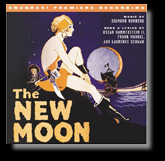 As delightful as Barbara Cook may be, my favorite theatrical recording
of the year comes from the most unlikeliest of places: the
2003 Encores! production of Oscar Hammerstein II and Sigmund Romberg's 1928
hit operetta The New Moon. While I am not usually a fan of the genre,
The New Moon is highly infectious, containing as it does such classic
ballads as "Softly, as in a Morning Sunrise" and "Lover Come Back to Me"
(both of which have become jazz standards), as well as rousing chorus
numbers like "Stouthearted Men." While the plot is pure stereotypical
operetta (the show is set in late 18th-century New Orleans and features the
usual stock revolutionaries, star-crossed lovers and plot elements based on
false assumptions), the lyrics by Hammerstein raise it above the typical
Viennese Schlag. To a person, the cast is incredible and does a remarkable
job of singing operatically while emoting theatrically (no mean feat, as
evidenced by last year's wooden and disappointing Firebrand of
Florence). As the romantic leads, Broadway's Christiane Noll and opera's
Rodney Gilfry are shear perfection. Noll, in particular, is a revelation and
shines on all of her numbers, most especially on a vibrant and thrilling
rendition of "Lover, Come Back to Me." Also of note are the contributions of
Alix Korey and Peter Benson. The sound on the album is incredible,
displaying a remarkable crispness and warmth that bodes well for future
Ghostlight recordings. As delightful as Barbara Cook may be, my favorite theatrical recording
of the year comes from the most unlikeliest of places: the
2003 Encores! production of Oscar Hammerstein II and Sigmund Romberg's 1928
hit operetta The New Moon. While I am not usually a fan of the genre,
The New Moon is highly infectious, containing as it does such classic
ballads as "Softly, as in a Morning Sunrise" and "Lover Come Back to Me"
(both of which have become jazz standards), as well as rousing chorus
numbers like "Stouthearted Men." While the plot is pure stereotypical
operetta (the show is set in late 18th-century New Orleans and features the
usual stock revolutionaries, star-crossed lovers and plot elements based on
false assumptions), the lyrics by Hammerstein raise it above the typical
Viennese Schlag. To a person, the cast is incredible and does a remarkable
job of singing operatically while emoting theatrically (no mean feat, as
evidenced by last year's wooden and disappointing Firebrand of
Florence). As the romantic leads, Broadway's Christiane Noll and opera's
Rodney Gilfry are shear perfection. Noll, in particular, is a revelation and
shines on all of her numbers, most especially on a vibrant and thrilling
rendition of "Lover, Come Back to Me." Also of note are the contributions of
Alix Korey and Peter Benson. The sound on the album is incredible,
displaying a remarkable crispness and warmth that bodes well for future
Ghostlight recordings.
 Ghostlight Records also preserved one of the surprise hits of last
season: a semi-staged concert production of E. Y. Harburg and Burton Lane's
classic (if problematic) show on Irish magic and racism, Finian's
Rainbow
. While the book has not aged as gracefully as the score
(although its message of tolerance and faith in the American Dream could not
be more timely), songs from the show have become firmly entrenched in the
American Songbook, thus making it a natural for a concert-style 'revival.'
It is doubtful that anybody reading this is not familiar with at least one
number from the show, containing as it does such standards as "How Are
Things In Glocca Morra?," "Look To The Rainbow," and "Old Devil Moon," plus
only slightly lesser-known numbers like "If This Isn't Love" or "When I'm
Not Near the Girl I Love." As is often the case, however, it is the obscure
numbers that pack the most punch, especially those that deal with racial and
societal issues, such as "Necessity" (a terrific bluesy number featuring
Terri White that utilizes some of Harburg's sliest lyrics), "The Begat" (a
pointed look at morals and politics that is just a shade bluer than Cole
Porter's "Let's Do It"), and "When The Idle Poor Become The Idle Rich." Ghostlight Records also preserved one of the surprise hits of last
season: a semi-staged concert production of E. Y. Harburg and Burton Lane's
classic (if problematic) show on Irish magic and racism, Finian's
Rainbow
. While the book has not aged as gracefully as the score
(although its message of tolerance and faith in the American Dream could not
be more timely), songs from the show have become firmly entrenched in the
American Songbook, thus making it a natural for a concert-style 'revival.'
It is doubtful that anybody reading this is not familiar with at least one
number from the show, containing as it does such standards as "How Are
Things In Glocca Morra?," "Look To The Rainbow," and "Old Devil Moon," plus
only slightly lesser-known numbers like "If This Isn't Love" or "When I'm
Not Near the Girl I Love." As is often the case, however, it is the obscure
numbers that pack the most punch, especially those that deal with racial and
societal issues, such as "Necessity" (a terrific bluesy number featuring
Terri White that utilizes some of Harburg's sliest lyrics), "The Begat" (a
pointed look at morals and politics that is just a shade bluer than Cole
Porter's "Let's Do It"), and "When The Idle Poor Become The Idle Rich."
While one does miss the rich orchestrations of the original cast
recording, the two-piano pairing of Mark Hartman and Mark Janas (the latter
of whom was not given credit for helping to create the arrangements with
Hartman: an oversight to be corrected in future pressings) weave a subtle
magical spell that enhances the stellar cast. Melissa Errico (as Irish
immigrant, Sharon McLonergan) shines via the most understated yet
emotionally connected rendition of "How Are Things In Glocca Morra?" I have
had the pleasure to hear. And Malcolm Gets gives a delightful performance as
the Leprechaun Og, especially in the bubbling "When I'm Not Near the Girl I
Love." While the album does not preserve the entire production (an
understandable, if somewhat disappointing oversight probably due to
licensing concerns, as this version of the show is available for future
productions), it is the most complete recording to date, containing as it
does intros and reprises not previously included on any other disc
(including the 'need to hear it to believe it' version produced by Frank Sinatra that features incredible performances
by Sammy Davis, Jr. coupled with such side-splitting,
'what-were-they-thinking' numbers as a version of "Necessity" as sung by
the McGuire Sisters).
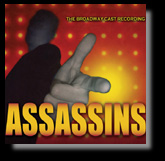 While the recording of Stephen Sondheim's newest musical, Bounce,
proved to be a disappointment, a recording of one of his most controversial
creations, Assassins, reminded musical theater lovers of his genius.
While the Broadway cast is, as a whole, not as vocally strong as those on
the Off-Broadway recording, Marc Kudisch's creepy portrayal of the
Proprietor, Neil Patrick Harris' effective (and sometimes tongue-in-cheek)
rendition of the Balladeer, Tony winner Michael Cerveris' impassioned
performance of Booth, and (my personal favorite) Becky Ann Baker's off-kilter
portrayal of would-be assassin of President Ford, Sara Jane Moore, make this
by far the best Broadway revival cast recording of the year. Also key to the
album's success is Tony winner Michael Starobin's remarkable job of fleshing
out his original 1991 orchestrations. While the recording of Stephen Sondheim's newest musical, Bounce,
proved to be a disappointment, a recording of one of his most controversial
creations, Assassins, reminded musical theater lovers of his genius.
While the Broadway cast is, as a whole, not as vocally strong as those on
the Off-Broadway recording, Marc Kudisch's creepy portrayal of the
Proprietor, Neil Patrick Harris' effective (and sometimes tongue-in-cheek)
rendition of the Balladeer, Tony winner Michael Cerveris' impassioned
performance of Booth, and (my personal favorite) Becky Ann Baker's off-kilter
portrayal of would-be assassin of President Ford, Sara Jane Moore, make this
by far the best Broadway revival cast recording of the year. Also key to the
album's success is Tony winner Michael Starobin's remarkable job of fleshing
out his original 1991 orchestrations.
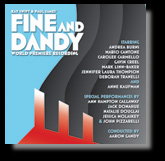 Many of the best albums of 2004 came from largely forgotten sources. A
case in point is Fine and Dandy, a 1930 hit by Kay Swift and Paul
James that somehow missed being recording until last year. This frothy
confection is graced with perfect pairings of song and singer, such as the
title song (sung by Carolee Carmello and Mario Cantone) or "Let's Go Eat
Worms in the Garden" (sung by Gavin Creel and Carmello), as well as the
lovely "Can This Be Love?" (beautifully sung by Carmello, who is also
powerful on the driving "Nobody Breaks My Heart," a number that deserves
greater exposure). This was the first album to be released by PS Classics as
part of its not-for-profit arm dedicated to preserving unrecorded shows from
the past. I, for one, can't wait to see what other treasures they will
unearth (for a glimpse at what the future may hold, visit
www.psclassics.org/support_us.html). Many of the best albums of 2004 came from largely forgotten sources. A
case in point is Fine and Dandy, a 1930 hit by Kay Swift and Paul
James that somehow missed being recording until last year. This frothy
confection is graced with perfect pairings of song and singer, such as the
title song (sung by Carolee Carmello and Mario Cantone) or "Let's Go Eat
Worms in the Garden" (sung by Gavin Creel and Carmello), as well as the
lovely "Can This Be Love?" (beautifully sung by Carmello, who is also
powerful on the driving "Nobody Breaks My Heart," a number that deserves
greater exposure). This was the first album to be released by PS Classics as
part of its not-for-profit arm dedicated to preserving unrecorded shows from
the past. I, for one, can't wait to see what other treasures they will
unearth (for a glimpse at what the future may hold, visit
www.psclassics.org/support_us.html).
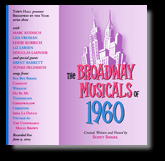 As always, Scott and Barbara Siegel's Broadway By The Year series
proved to be one of last season's theatrical highlights. And, as usual, the
CDs spawned by the event proved to be no less magical and are 'must have'
albums for theater lovers. While I am still waiting for the recording of my
favorite entry in the series to be released (The Broadway Musicals of
1935, which featured Karen Akers, Emily Skinner, Todd Murray and Barbara
Walsh), the two albums released this year made for more than adequate
stand-ins. As always, Scott and Barbara Siegel's Broadway By The Year series
proved to be one of last season's theatrical highlights. And, as usual, the
CDs spawned by the event proved to be no less magical and are 'must have'
albums for theater lovers. While I am still waiting for the recording of my
favorite entry in the series to be released (The Broadway Musicals of
1935, which featured Karen Akers, Emily Skinner, Todd Murray and Barbara
Walsh), the two albums released this year made for more than adequate
stand-ins.
The Broadway Musicals of 1960 features such highlights as Tovah
Feldshuh performing numbers both known (a comic "Kids" from Bye Bye
Birdie) and obscure (the politically pointed "Ism," a Sheldon
Harnick/David Baker number from Vintage 60), Marc Kudisch revisiting
his role as Conrad Birdie with a delightfully over-the-top "One Last Kiss,"
and Eddie Korbich's tour de force performance of "The Late Late Show" (Do
Re Mi).
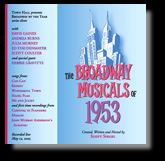 Not to be outdone, The Broadway Musicals of 1953 features four
numbers from Wonderful Town that rival anything heard in the current
revival ("A Little Bit in Love," sung by Andrea Burns, "A Quiet Girl,"
divinely sung by Davis Gaines, "One Hundred Easy Ways" sung by Julia Murney,
and a western-flavored "Ohio" by Murney and Burns), as well as the true
reason to buy the album: three never-before-recorded numbers from
Carnival in Flanders (Debbie Gravitte's "How Far Can a Lady Go?," and
Ed Staudenmayer's "The Sudden Thrill" and "You Can Trust the Word of a
Gentleman"). Not to be outdone, The Broadway Musicals of 1953 features four
numbers from Wonderful Town that rival anything heard in the current
revival ("A Little Bit in Love," sung by Andrea Burns, "A Quiet Girl,"
divinely sung by Davis Gaines, "One Hundred Easy Ways" sung by Julia Murney,
and a western-flavored "Ohio" by Murney and Burns), as well as the true
reason to buy the album: three never-before-recorded numbers from
Carnival in Flanders (Debbie Gravitte's "How Far Can a Lady Go?," and
Ed Staudenmayer's "The Sudden Thrill" and "You Can Trust the Word of a
Gentleman").
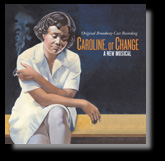 While the book of Caroline, Or Change was problematic at best,
musically the show improves upon each listening, thanks to its composer,
Jeanine Tesori (once again building the promise she showed in Violet
after a detour with Thoroughly Modern Millie). Even though I have
not listened to the two-disc set since reviewing it this summer, snippets of
its score oftentimes float unbidden in my mind, a prime indicator if
its musical strengths. While the book of Caroline, Or Change was problematic at best,
musically the show improves upon each listening, thanks to its composer,
Jeanine Tesori (once again building the promise she showed in Violet
after a detour with Thoroughly Modern Millie). Even though I have
not listened to the two-disc set since reviewing it this summer, snippets of
its score oftentimes float unbidden in my mind, a prime indicator if
its musical strengths.
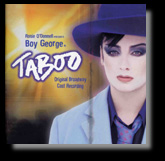 It can not be denied that if Taboo's cast album were released
while the Broadway production was still running, the show would probably have had a longer (yet
no less beleaguered) run. Though it was problematic and troubled from
the start, its cast and its score make the Broadway cast album eminently
listenable and enjoyable, especially Euan Morton (as Boy George), Raul
Esparza (Philip Sallon) and Liz McCartney (Big Sue), whose "Stranger In This
World," "Petrified," and "Talk Amongst Yourselves" were three of the best
numbers of the year. It can not be denied that if Taboo's cast album were released
while the Broadway production was still running, the show would probably have had a longer (yet
no less beleaguered) run. Though it was problematic and troubled from
the start, its cast and its score make the Broadway cast album eminently
listenable and enjoyable, especially Euan Morton (as Boy George), Raul
Esparza (Philip Sallon) and Liz McCartney (Big Sue), whose "Stranger In This
World," "Petrified," and "Talk Amongst Yourselves" were three of the best
numbers of the year.
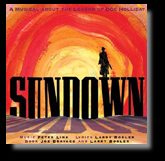 I found the biggest surprise of the year, theatrical recording-wise at least,
while listening to the recently released recording of
Sundown whilst Stairmastering at Harlem's New York Sports Club. While it is arguably not the best place to listen to a musical about the 1881
gunfight at the O.K. Corral, the fact that its country music-inspired score
cut through the hip-hop blaring overhead and completely captivated me should
speak volumes to the strength of the score and its performers. I found the biggest surprise of the year, theatrical recording-wise at least,
while listening to the recently released recording of
Sundown whilst Stairmastering at Harlem's New York Sports Club. While it is arguably not the best place to listen to a musical about the 1881
gunfight at the O.K. Corral, the fact that its country music-inspired score
cut through the hip-hop blaring overhead and completely captivated me should
speak volumes to the strength of the score and its performers.
Written by
composer Peter Link (King of Hearts, Salvation) and lyricist Larry
Rosler (who, with Joe Bravaco, also wrote the book), the show is more
tuneful and emotionally resonant than many shows to hit the Great White Way
in recent memory. The show has seen a few productions already (the Lyric
Stage in Irvine, Texas, and Virginia's Barter, as well as a staged reading
at New York's York Theatre Company), and the recording is a studio cast
recording featuring Broadway actors Steve Blanchard (currently the Beast in
Beauty and the Beast) as Doc Holliday, Judy McLane (currently Tanya in
Mamma Mia!) as his lady love Kate Fisher, and Patrick Ryan Sullivan
as Wyatt Earp.
If your knowledge of the gunfight is limited (like mine is) to the Star
Trek episode "Spectre of the Gun," Sundown recounts the classic tale of
the old west, wherein Doc Holliday joined forces with Wyatt Earp and his
brothers to battle the Clanton Gang in Tombstone, Arizona. Told from the
point of view of Doc Holliday, the show manages what other Western shows
tried and almost achieved (such as Johnny Guitar) or flat-out failed
miserably at (such as Urban Cowboy - indeed, the sensual
pick-up number "One More Drink" sung by Joe Lutton and Judy McLane
perfectly captures the spirit and playfulness that was missing from Urban
Cowboy). And that is, tell a tuneful tale set in the mythic west that
consists of three-dimensional characters that have a reason to sing (and do
so with more than passable songs to boot!).
Musically, Sundown recalls a harder edged Big River, thanks
to rollicking character numbers like "Fly In The Ointment" and
"Politickin'," which stand side by side with beautiful ballads like
"Bridges" (beautifully performed by Judy McLane) and the title song (a
plaintive 'end of the trail' number sung by Doc Holliday). While the CD is
hampered at times by arrangements featuring far-too-obviously synthesized
instruments, the material in general and the performers in particular make
for an incredibly strong and highly listenable album. For more information
and to listen to samples, visit www.sundownmusical.com.
-- Jonathan Frank
Make sure to check our list of Upcoming Releases.
|
|

